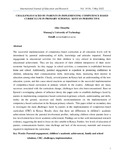Challenges Faced by Parents in Implementing Competence Based Curriculum in Primary Schools: Kenyan Perspective
Abstract
The successful implementation of competency-based curriculum at all education levels will be determined by parental understanding of skills, knowledge and attitudes imparted. Parental engagement in educational activities for their children is very critical in determining their educational achievement. They are key educators of their children irrespective of their socioeconomic backgrounds. As they engage in school activities, a connection is established between home and school. Additionally, parental engagement is expedient in promoting confidence in children, enhancing their communication skills, motivating them, increasing their interest in education among other benefits. Clearly, several parents in Kenya lack an understanding of the new education system; and this cause mixed reactions an impediment to the successful implementation of competency-based curriculum in primary schools in the country. Although there are many successes associated with the curriculum change, challenges have also been encountered. Base on Epstein’s overlapping spheres of influence theory this paper seeks to establish challenges faced by parents in implementing competence based curriculum in primary schools, understanding and skills, reality on the ground, successes and finally recommendations on the implementation of competency-based curriculum in the Kenyan primary schools. This paper relied on secondary data to investigate the main challenges faced by parents in the implementation of competence-based curriculum (CBC) in Kenya. Results show that there are differences in children’s academic achievement between the parental involvement profiles, indicating children whose parents have a low involvement have lower academic achievement. Findings are in line with international research evidence, suggesting the need to focus on this variable in Kenya. Further, low levels of education of parents, communication barrier, time challenge and lack of the necessary materials and resources required to implement the curriculum.

